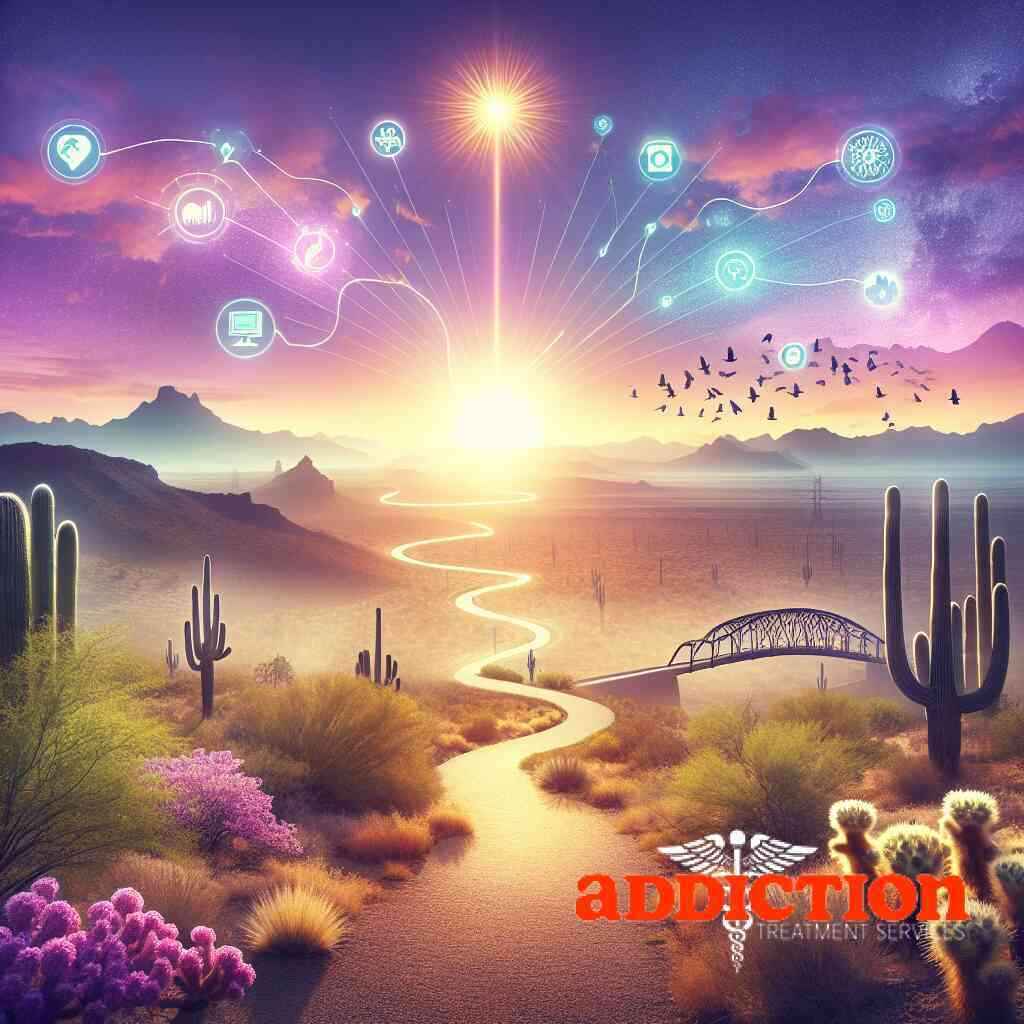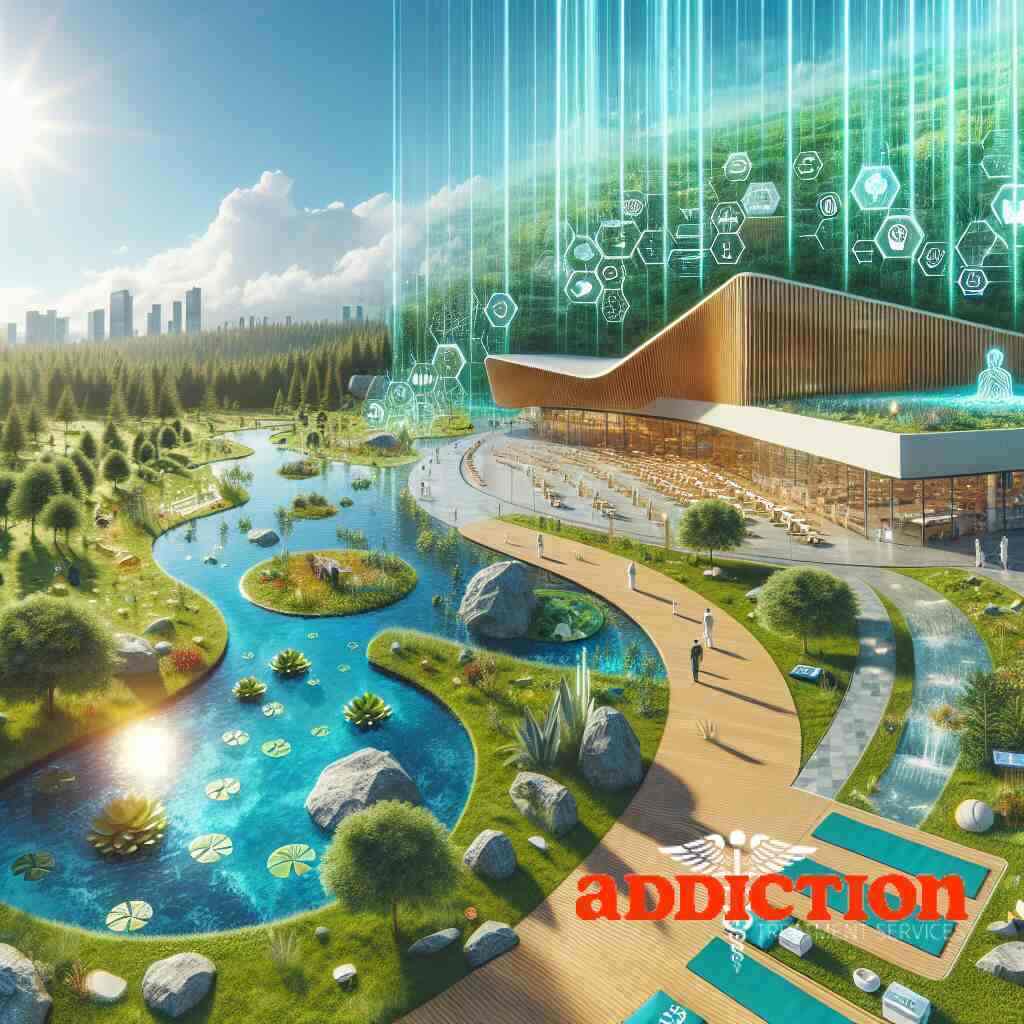 Posted On: 09/10/2024
Posted On: 09/10/2024Introduction
The Evolution of Addiction Treatment in Arizona
The landscape of addiction treatment in Arizona has transformed over the past decades, paving the way for more nuanced and effective approaches to substance use disorders. Initially characterized by traditional rehab and detox programs, the treatment spectrum in Arizona has broadened significantly to include holistic solutions, telehealth services, and cutting-edge technologies aimed at personalizing and enhancing the recovery journey. The introduction of these innovative methods marks a pivotal shift in how professionals and those battling addiction view the path to recovery.
Why Arizona’s Innovations Matter in 2024
In 2024, the significance of Arizona’s addiction treatment innovations cannot be overstated. As substance use disorders continue to evolve, so too must the methods we employ to combat them. Arizona’s commitment to integrating new technologies and therapies directly addresses the diverse needs and circumstances of individuals seeking help. By prioritizing accessibility, personalization, and holistic healing, Arizona sets a precedent for how addiction treatment can adapt to meet emerging challenges head-on, offering hope and tangible solutions to those in need.
Overview of Emerging Technologies and Methods
Emerging technologies and methods in addiction treatment signal a new era of recovery possibilities in Arizona. From the implementation of telehealth services that break down geographical and scheduling barriers to the use of artificial intelligence for personalized treatment plans and relapse prediction, these advancements offer unprecedented support to individuals in recovery. Additionally, the development of digital detox programs, virtual reality therapies, and mobile monitoring tools provides innovative avenues for engagement and support. Together, these technologies and methodologies form the backbone of Arizona’s forward-thinking approach to addiction treatment in 2024, promising a more inclusive, effective, and personalized recovery experience for all.
Holistic Addiction Solutions in Arizona
Incorporating Mind, Body, and Spirit
The integration of mind, body, and spirit in addiction recovery reflects a groundbreaking shift in Arizona’s approach to treating substance use disorders in 2024. Unlike conventional methods that primarily focus on the physical aspect of addiction, holistic addiction solutions recognize the intricate interplay between psychological, physical, and spiritual health. Programs now encompass a range of therapies, such as mindfulness practices, meditation, and yoga, each designed to address the multifaceted nature of addiction. By nurturing all aspects of an individual’s being, these holistic programs aim to facilitate a deeper, more sustainable recovery process. This person-centered approach not only seeks to heal the body from the harms of substance abuse but also to mend the mind and rejuvenate the spirit, laying a solid foundation for long-term wellness.
The Role of Nutrition and Exercise in Recovery
Nutrition and exercise have emerged as pivotal components of holistic addiction recovery in Arizona, with a growing body of evidence underscoring their efficacy in supporting the rehabilitation process. Nutritional therapy, for instance, addresses the dietary deficiencies often seen in individuals with long-term substance use, aiding in the restoration of physical health and enhancing cognitive function. Customized meal plans ensure that recovery is not just about abstaining from substances but also about rebuilding and nourishing the body.
Similarly, structured exercise programs are being integrated into treatment plans, recognizing the powerful role of physical activity in reducing stress, improving mood, and strengthening the body against the physical tolls of addiction. Whether through group sports, individual fitness coaching, or therapeutic movements like Tai Chi, these activities offer the dual benefit of enhancing physical health while also providing a positive outlet for stress and emotional regulation.
Emerging Holistic Therapies and Their Efficacy
The exploration of emerging holistic therapies has introduced innovative addiction solutions in Arizona, emphasizing the state’s commitment to evolving recovery methodologies. Among these are biofeedback and neurofeedback, technologies that enable individuals to gain control over physiological processes that are typically involuntary-such as heart rate and brain activity, to manage stress and emotional responses more effectively.
Equally notable is the adoption of alternative practices like acupuncture and aromatherapy, which have shown promise in alleviating symptoms of withdrawal and reducing cravings. Such therapies are integrated into holistic addiction solutions in Arizona, offering complementary pathways to traditional medical treatments and supporting a more rounded recovery journey. By embracing these innovative practices, Arizona sets a precedent for comprehensive care that accords equal importance to the physical, psychological, and spiritual facets of healing from addiction.
Telehealth Addiction Services Expansion
Breaking Barriers with Remote Consultations
The expansion of telehealth addiction services in Arizona in 2024 is redefining access to essential support for individuals battling substance use disorders. This innovative approach breaks down the geographical and logistical barriers that previously limited the reach of traditional addiction treatment services. Remote consultations via secure video conferencing platforms enable individuals to connect with dedicated professionals from the comfort of their homes, offering a discrete and accessible avenue for those who may have hesitated to seek help due to stigma or logistical challenges. Through telehealth services, Arizona showcases its commitment to creating a more inclusive and accessible environment for addiction recovery, ensuring that geographical location is no longer an impediment to receiving high-quality care.
Telehealth Platforms for Continuous Support
The utilization of telehealth platforms in Arizona’s addiction treatment services marks a critical shift towards a more dynamic and responsive care model. These platforms provide a continuous line of support, enabling real-time communication between patients and healthcare providers. Such platforms facilitate not only initial assessments and counseling but also ongoing therapy sessions, routine check-ins, and emergency support when needed. This constant availability is crucial for maintaining the momentum of the recovery process, offering assurance and guidance every step of the way. Moreover, telehealth services incorporate a range of interactive tools and resources, enhancing the treatment experience and empowering individuals with knowledge and strategies to manage their recovery effectively.
Ensuring Confidentiality and Security in Virtual Settings
As telehealth for addiction services in Arizona continues to evolve, ensuring the confidentiality and security of patient information remains paramount. Telehealth platforms are designed with robust security measures, adhering to strict privacy regulations to protect sensitive health data. These measures include end-to-end encryption, secure patient portals, and compliance with healthcare standards like HIPAA (Health Insurance Portability and Accountability Act). By prioritizing these aspects, Arizona’s telehealth addiction services build trust and assurance, fostering a safe environment for individuals to openly share and engage in their recovery journey without fear of privacy breaches or unauthorized access to their personal information.
Artificial Intelligence (AI) in Addiction Recovery

AI-driven Personalized Treatment Plans
The advent of AI in the realm of addiction recovery represents a significant leap forward in creating highly customized treatment plans for individuals in Arizona. By analyzing vast datasets on patient history, substance use patterns, and recovery outcomes, AI-driven systems can identify the most effective strategies for each person’s unique situation. This means considering factors that human clinicians might overlook, such as subtle patterns in behavior or the influence of concurrent mental health conditions. The result is a tailor-made program that adapts to an individual’s changing needs, significantly enhancing the likelihood of long-term recovery. This personalized approach not only streamlines the recovery process but also ensures that every patient receives the care most relevant to their recovery journey.
Machine Learning for Predicting Relapse Risks
Machine learning, a critical subset of AI, is revolutionizing the way clinicians approach the prediction and prevention of relapses in substance use disorders. By continuously analyzing data from a variety of sources, including patient check-ins, physiological markers, and environmental factors, these advanced systems can detect early warning signs of a potential relapse. This proactive approach enables healthcare providers to intervene much earlier, offering targeted support or adjustments to the treatment plan to avert a setback. The predictive power of machine learning is a game-changer in addiction recovery, offering hope for more sustained success rates by staying one step ahead of relapse triggers.
Chatbots for Immediate Emotional Support
In the digital age, immediate access to support can make a significant difference in the lives of those battling addiction. AI-powered chatbots are emerging as a vital resource, providing 24/7 emotional support and guidance. Through natural language processing, these chatbots can understand and respond to a wide array of queries and emotions, offering comforting words, advice, and even crisis intervention when necessary. While not a replacement for human interaction or professional counseling, chatbots serve as an additional layer of support, ensuring that no one has to face a moment of weakness alone. As these technologies continue to evolve, they promise to become an ever more integral part of the supporting network for individuals navigating the challenges of recovery in Arizona.
Digital Detox and Virtual Reality Therapies
Implementing Digital Detox Programs
The landscape of addiction recovery is embracing the concept of digital detox, recognizing the growing concern over digital addiction alongside substance abuse. In Arizona, innovative addiction services in 2024 are incorporating digital detox programs designed to mitigate the impact of constant connectivity and screen time on mental health. These programs often start with a comprehensive assessment of an individual’s digital usage patterns, followed by a tailored plan that encourages participation in offline activities and fosters real-world interactions. By reintegrating individuals into a balanced lifestyle, where digital devices serve a purpose without dominating daily life, these detox programs aid in enhancing focus, reducing stress, and promoting healthier social behaviors. As part of a holistic treatment plan, digital detox initiatives represent a critical step towards addressing the multifaceted nature of addiction recovery. For more insights on incorporating these initiatives, Innovative Addiction Services in Arizona 2024 offers a wealth of information and guidance.
Virtual Reality for Safe Exposure and Therapy
Arizona’s addiction treatment landscape is also paving the way for the use of Virtual Reality (VR) in therapy. This cutting-edge approach provides safe exposure to triggers and challenging environments in a controlled setting. VR therapy offers a unique way for individuals to confront and cope with their triggers, practice stress-reduction techniques, and improve their decision-making skills without real-world consequences. This immersive technology can simulate scenarios where individuals are exposed to drug-related cues or stressful situations, allowing therapists to guide patients through coping mechanisms and cognitive-behavioral strategies in real time. The controlled, repeatable nature of VR scenarios ensures a consistent therapeutic environment, enabling individuals to gain confidence in their ability to resist temptations and manage their reactions in various contexts. As VR technology continues to evolve, its application in addiction recovery promises a broader range of therapeutic possibilities, revolutionizing how individuals understand and confront their addiction.
Gamification and VR in Enhancing Engagement
Gamification elements within VR therapy and recovery programs are redefining engagement and motivation in addiction treatment. By integrating game-like mechanics and rewards into the recovery process, individuals are encouraged to participate actively and consistently in their treatment programs. These elements, such as earning points for completing therapy sessions, reaching milestones in sobriety, or participating in wellness challenges, inject a sense of achievement and progress into the recovery journey. Arizona’s innovative approach to incorporating gamification and VR not only makes treatment more interactive and enjoyable but also leverages human psychology to foster positive behaviors and resilience against relapse. Recognizing the potential of these technologies to transform engagement in addiction recovery, Arizona continues to lead in the integration of such advanced methods, setting a benchmark for efficacy and patient satisfaction in the treatment of substance use disorders.
Mobile and Wearable Technologies
Mobile Apps for Addiction Recovery Tracking
The emergence of mobile apps specifically designed for addiction recovery tracking marks a significant advancement in the landscape of addiction services in Arizona in 2024. These apps offer a personalized approach to recovery, enabling individuals to monitor their progress, set and achieve goals, and gain insights into their patterns and triggers. Features often include daily check-ins, mood tracking, motivational alerts, and access to resources or emergency support at the touch of a button. By providing a constant, accessible form of support, these apps play a crucial role in reinforcing the recovery process outside of traditional settings. Moreover, the integration of gamification techniques motivates users through rewards and achievements, making the daunting journey of recovery more engaging and manageable. The utilization of such innovative drug rehabilitation innovations via mobile technology reflects Arizona’s commitment to embracing digital solutions to enhance addiction treatment outcomes.
Wearables Monitoring Physical and Emotional Health
In addition to mobile apps, wearable technologies have taken center stage in Arizona’s innovative approach to addiction recovery services. These devices, worn on the body, continuously monitor physiological and emotional indicators that are vital to the recovery process, such as heart rate variability, sleep patterns, and stress levels. This real-time data not only provides individuals with immediate feedback on their well-being but also equips healthcare providers with crucial information to tailor treatment plans more effectively. Wearables can alert wearers and clinicians to potential stressors or triggers, enabling proactive management of situations that might otherwise lead to relapse. The data collected by these devices also contributes to a richer understanding of the influence of physical health on addiction recovery, emphasizing the interconnectedness of body and mind in the healing process. Integrating such addiction treatment analytics in Arizona ensures a holistic and personalized approach to rehabilitation.
Integrating Data for Comprehensive Care Plans
The integration of data collected through mobile apps and wearable technologies represents a quantum leap in formulating comprehensive care plans for individuals undergoing addiction treatment in Arizona. This convergence of digital health data provides an unprecedented level of insight into an individual’s recovery journey, allowing for the dynamic adjustment of treatment strategies in real time. Healthcare providers can analyze patterns in behavior, physiological responses, and progress over time to identify what works best for each unique case. Machine learning algorithms can further refine these insights, predicting potential challenges and customizing interventions to prevent relapse. The result is a highly personalized, data-driven approach to addiction recovery that aligns with the individual’s specific needs and circumstances. Arizona’s pioneering efforts in navigating addiction recovery services with the aid of mobile and wearable technology illustrate a future where treatment is not only reactive but also predictive, paving the way for more effective and enduring recoveries.
Medication-Assisted Treatment (MAT) Innovations
Latest Developments in MAT for Opioid Use Disorder
In the ever-evolving field of addiction treatment, Medication-Assisted Treatment (MAT) stands as a beacon of progress, especially for those grappling with Opioid Use Disorder (OUD). As of 2024, Arizona is at the forefront of pioneering MAT innovations, integrating the latest pharmacological advances to offer a lifeline to individuals seeking freedom from opioid dependency. The recent developments in MAT not only emphasize the efficacy of combining medication with counseling and behavioral therapies but also underscore the introduction of new drugs designed to mitigate withdrawal symptoms, reduce cravings, and prevent relapse more effectively than ever before. Among these advances, the use of extended-release formulas offers consistent therapeutic levels of medication, ensuring a steadier recovery process and minimizing the risks associated with fluctuations in medication levels. This progression towards more sophisticated treatment options signals a significant leap forward in the quest to address the nuances of OUD, promising a more hopeful future for recovery.
Customizing MAT Based on Genetic Testing
Tailoring MAT to the individual’s genetic makeup represents one of the most cutting-edge approaches to treating addiction, particularly in Arizona’s battle against the opioid epidemic. Genetic testing allows for an unprecedented level of personalization in MAT, pinpointing the most effective medications while identifying potential adverse reactions based on the individual’s DNA profile. This precision medicine approach not only enhances the safety and efficacy of MAT but also significantly improves patient outcomes by avoiding the trial-and-error process often associated with finding the right medication. Furthermore, genetic insights into an individual’s metabolism can guide dosage decisions, ensuring the optimal therapeutic effect of MAT drugs. The integration of genetic testing into MAT protocol is a testament to Arizona’s commitment to leveraging advancements in science and technology to offer more individualized and effective addiction treatment services.
The Future of Non-addictive Pain Management
As we navigate the complexities of addiction treatment, one of the most promising horizons is the development of non-addictive pain management solutions. This innovation is particularly crucial in addressing the root cause that often leads to opioid addiction: the management of chronic pain. Arizona is pioneering in the research and application of novel, non-opioid-based treatments that promise effective pain relief without the risk of addiction. These advancements include new pharmaceutical compounds, neuromodulation techniques, and the exploration of natural and synthetic alternatives that target pain pathways without triggering the reward centers of the brain associated with substance use disorders.
The focus on non-addictive pain management aligns with the broader objective of curbing the initiation of opioid use and provides a compelling alternative for those in recovery from OUD. By reducing the reliance on opioids for pain relief, Arizona is setting a new standard in preventive care, aligning treatment paradigms with the principles of harm reduction and patient safety. The trajectory of these innovations not only reshapes the landscape of pain management but also represents a pivotal shift in the overarching strategy to combat the opioid crisis, heralding a new era in addiction and pain treatment services.
Advanced Outpatient Services and Community Support
The realm of addiction treatment in Arizona is witnessing a noteworthy evolution, particularly in the development and enhancement of outpatient services. Emphasizing flexible and accessible care, these services are increasingly tailored to meet the individual needs and circumstances of those seeking recovery.
Outpatient Programs Tailored for Individual Needs
Outpatient programs in Arizona stand out for their commitment to personalization. Recognizing the unique journey of each facing substance use disorders, these programs are designed to adapt to varying schedules, treatment preferences, and specific health requirements. For instance, some may focus on Reco Intensive addiction treatment center’s methodologies, integrating evidence-based practices with holistic approaches to ensure a comprehensive treatment experience. This customization extends to incorporating medication-assisted treatment advancements, where applicable, to address the physical aspects of addiction alongside behavioral therapies that tackle psychological triggers.
The flexibility of these programs allows individuals to maintain their daily responsibilities, such as employment or education, while actively participating in their recovery process. This balance is crucial for fostering a sense of normalcy and stability, which is instrumental in the sustainable recovery journey.
Leveraging Online Recovery Communities
The power of community cannot be underestimated in the realm of addiction recovery. Online recovery communities have emerged as vital platforms for support, motivation, and shared learning. Arizona has pioneered in facilitating these virtual spaces, where those in recovery can connect, share their experiences, and find solace in the collective journey toward sobriety.
These communities vary in format, from forums and social media groups to more structured virtual meetings akin to Alcoholics Anonymous meetings in Arizona. The anonymity and accessibility of these online communities play a significant role in encouraging participation, especially for those who may feel hesitant to engage in face-to-face encounters. By providing a judgment-free space, online recovery communities augment traditional treatment methods with peer support and a sense of belonging, which are crucial elements of the recovery process.
Peer Support Software for Continuous Engagement
Innovation in addiction treatment in Arizona also extends to the use of peer support software, a digital tool designed to enhance engagement and continuity in the recovery process. This technology enables seamless communication between individuals in recovery and their support network, including counselors, peer support specialists, and fellow recovery members.
These platforms offer various functionalities, such as direct messaging, group chats, and even mood-tracking features, allowing for real-time support and intervention. The implementation of peer support software represents a significant leap in leveraging digital solutions to foster a supportive recovery environment where help and encouragement are just a click away. This constant access to a support network helps mitigate feelings of isolation and can significantly reduce the risk of relapse, ensuring that individuals remain actively engaged in their recovery journey.
Arizona’s innovative outpatient services and community support mechanisms are emblematic of the state’s forward-thinking approach to addiction treatment. By embracing technology and personalized care models, Arizona is setting new standards in accessible, effective, and compassionate addiction recovery services.
Conclusion
The Path Forward with Arizona’s Addiction Treatment Innovations
As we peer into the future of addiction treatment in Arizona in 2024, it’s evident that the landscape is being redefined by relentless innovation and a deep-seated commitment to comprehensive care. The advancements made in this sector, from Medication-assisted treatment advancements to the integration of AI and VR in therapy, underscore a collective endeavor to address substance use disorders with unprecedented precision and empathy. These innovations are not merely technological feats but represent a holistic shift towards recognizing and treating addiction as a complex interplay of physical, psychological, and environmental factors. The path forward is clear: leveraging these advancements to craft personalized, effective, and accessible treatment services that resonate with and empower individuals at every stage of their recovery journey.
Embracing New Technologies and Therapies for a Brighter Future
Embracing new technologies and therapies signals a pivotal shift towards a brighter future in addiction treatment. Arizona’s robust assimilation of cutting-edge methodologies, including telehealth platforms, digital detox programs, and mobile recovery apps, speaks volumes about the state’s foresight in harnessing technology to enhance the reach and efficacy of addiction services. These tools not only democratize access to essential treatment services but also introduce a level of engagement and personalization that was previously unimaginable. With resources like the Summer 2024 guide to addiction recovery in Arizona, individuals seeking help can navigate this new terrain with confidence, knowing they have the support of groundbreaking interventions that resonate with the digital age.
Arizona’s Role in Shaping the Future of Addiction Treatment
Arizona stands at the forefront of reimagining addiction treatment, playing a pivotal role in shaping the future of how we approach recovery services. Through its commitment to innovation, Arizona is not only addressing the immediate needs of its residents but also setting a benchmark for others to follow. The state’s forward-thinking approach, exemplified by its adoption of holistic solutions, engagement with emerging technologies, and focus on creating an inclusive, supportive community, paves the way for a new paradigm in addiction treatment. This blueprint for the future recognizes the necessity of evolving with the times, ensuring that as the landscape of addiction changes, so too will the methods we employ to combat it. Arizona’s journey signifies a hopeful outlook, one where the light of innovation and compassion illuminates the path to recovery.
With these advancements, Arizona solidifies its position as a beacon of hope and a model of excellence in the field of addiction treatment. By continuing to embrace and invest in the latest technologies and therapies, Arizona not only enhances the quality of life for those affected by substance use disorders but also contributes to the broader narrative of recovery and resilience.
Frequently Asked Questions
Question: What types of holistic addiction solutions in Arizona do Addiction Treatment Services offer for 2024?
Answer: Addiction Treatment Services offers a comprehensive directory of holistic addiction solutions in Arizona, focusing on the integration of mind, body, and spirit in the treatment process. In 2024, we’re highlighting centers that encompass a range of therapies, such as mindfulness practices, meditation, yoga, and nutritional guides designed to address the multifaceted nature of addiction. These person-centered approaches aim to facilitate a deeper, more sustainable recovery process. By connecting you with facilities that prioritize holistic healing, we ensure you access the best addiction recovery advancements Arizona has to offer.
Question: How does the use of AI in addiction recovery in Arizona enhance the treatment programs listed on your site?
Answer: At Addiction Treatment Services, we’re excited about the role of AI in addiction recovery, especially in Arizona’s cutting-edge addiction services. AI-driven personalized treatment plans and the use of machine learning to predict relapse risks significantly enhance the treatment programs we list. These technologies enable the creation of highly customized care plans, efficiently adjusting to the individual’s changing needs and significantly improving long-term recovery outcomes. By featuring centers that incorporate AI and related technologies, we facilitate access to innovative treatment options that offer a greater level of personalization and predictive analytics in treatment progress.
Question: Can you explain the benefits of telehealth addiction services in Arizona and how your directory supports access to these services?
Answer: Telehealth addiction services in Arizona present a flexible and accessible mode of treatment, crucial for individuals facing geographical and scheduling barriers. Our directory specifically highlights centers that offer robust telehealth services, breaking down the barriers to access essential support. Through secure video conferencing platforms, these services provide a discrete and accessible avenue for recovery, from initial assessments to ongoing therapy sessions. The benefits include the convenience of receiving treatment from home, reduced need for travel, and the ability to maintain privacy. By supporting telehealth, Addiction Treatment Services ensures you find a program that meets your needs while prioritizing confidentiality and personalized care.
Question: In the context of ‘What Are Innovative Addiction Services in Arizona 2024’, how do digital detox programs and virtual reality (VR) therapies contribute to recovery?
Answer: In our detailed exploration of ‘What Are Innovative Addiction Services in Arizona 2024’, digital detox programs and VR therapies stand out as significant contributions to the recovery landscape. Digital detox programs are designed to address the challenges posed by digital addiction, promoting a balanced lifestyle and improving mental health. Meanwhile, VR therapies offer safe, controlled environments for individuals to confront triggers, practice coping strategies, and enhance their decision-making skills through simulated real-life scenarios. These innovative approaches are part of Arizona’s commitment to leveraging technology to create more effective, engaging, and personalized treatment paths. By listing centers that provide these advanced methodologies, Addiction Treatment Services ensures access to a recovery journey that uses the forefront of technology to address substance use disorders.
Question: What advancements in Medication-Assisted Treatment (MAT) for Opioid Use Disorder can be expected in Arizona for 2024, according to your offerings?
Answer: For 2024, Arizona is set to witness significant advancements in Medication-Assisted Treatment (MAT) for Opioid Use Disorder, a key area of focus for Addiction Treatment Services. Expect to see the introduction of new, more effective medications designed to mitigate withdrawal symptoms, reduce cravings, and prevent relapse, including extended-release formulas that provide stable therapeutic levels. Additionally, the customization of MAT based on genetic testing is becoming a reality, offering unprecedented personalization in treatment plans. Our directory encompasses facilities at the forefront of these innovations, ensuring you’re connected with treatment options that not only follow but lead the latest developments in addiction treatment and pain management without addiction risk.



